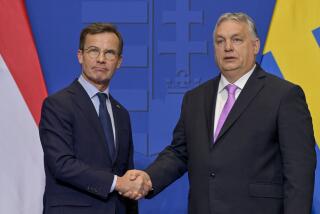Op-Ed: Sweden refused to impose a coronavirus lockdown. The country’s ambassador explains why
- Share via
Why is everybody talking about Sweden?
Lately, my country has caught the attention of the media in the United States for an unexpected reason. As the entire world struggles to manage the spread of the novel coronavirus, Sweden’s response to the pandemic has been singled out as “radical,” “lax” and “controversial” because Sweden has not imposed a broad general lockdown, an approach taken by many other countries.
Sweden is known as a country with a strong welfare model, including public healthcare for all, and has among the world’s highest life expectancies. Some might find it difficult to reconcile this image with our approach to containing COVID-19. It’s time to set the record straight on what is going on in Sweden.
Sweden shares the same goals as all other countries — to save lives and protect public health. We are also facing the same challenges as other countries; namely, the scale and speed of the virus’ spread and the pressure on the national health system. The objective is to reduce the pace of the coronavirus’ spread and to “flatten the curve” so that large numbers of people do not become ill at the same time.
Sweden is tackling the coronavirus pandemic through both legally enforced measures and recommendations. Like most other countries, we are promoting social distancing, protecting vulnerable people and at-risk groups, carrying out testing and strengthening our health system to cope with the pandemic.
The government has banned visits to care homes for the elderly and made changes to the social security system to make it easier for people with COVID-19 symptoms to take sick leave. Public gatherings of more than 50 people are banned. Secondary schools and university and college classes have moved to online instruction, and people are encouraged to work from home.
Sweden’s measures differ from other countries in a few significant ways. We are not shutting down schools for younger children or daycare facilities. We have no regulation that forces citizens to remain in their homes. And we have not ordered the closure of any businesses, though businesses like restaurants are required to operate with social distancing rules.
Swedish laws on communicable diseases are mostly based on voluntary measures and on individual responsibility. Sweden’s coronavirus strategy builds upon those principles. It’s a strategy that makes sense for Sweden, but we are humble enough to admit that it may make less sense elsewhere, because all societies are different.
The key here is the high level of trust in Swedish society. According to the World Values Survey, there is a high level of interpersonal trust between Swedes, and there is also a high level of trust in public authorities. The authorities also have a high level of trust in citizens to heed their advice.
The use of recommendations in public health efforts — rather than mandates — is a common strategy in Sweden. One example of this is child immunizations. In contrast to the United States, where all 50 states mandate immunizations for children in order to enroll in school (although there are exemptions given), Sweden’s child vaccination program is based on recommendations from the authorities and is not a legal requirement. Yet more than 97% of Swedish children are vaccinated in accordance with the recommended immunization schedule.
It is too early to draw any firm conclusions about the effectiveness of the measures taken in Sweden, but they are continuously reassessed by our public health experts.
It is deeply saddening that the virus has hit care homes for the elderly hard in Sweden. One of the main priorities now is to strengthen protections for those living in care homes. More personal protective equipment and online education for staff are being provided, testing has increased and more than 1,000 inspections will be carried out by the Health and Social Care Inspectorate.
It is also too early to compare infection rates and death tolls internationally, since countries differ in how they count coronavirus-related deaths. Countries differ in terms of population density, age structure and housing culture — and many other factors that affect the spread of the virus. Countries are also in different stages of the pandemic, and in different phases of maintaining or relaxing measures.
Eventually the world will need to agree on how to register COVID-19 deaths, how to detect unregistered cases and how to evaluate the general health effects of the coronavirus on the entire population. It will be important to learn from all of this to prepare ourselves for potential future outbreaks of similar viruses.
In the meantime, life is not carrying on as normal in Sweden. Most people are staying at home voluntarily. Domestic train travel, a major means of transportation, has fallen drastically, and almost all domestic flights have been canceled. Many businesses have closed. Unemployment is expected to rise dramatically. In response, the government has approved crisis packages to mitigate the financial impact of the pandemic on Swedish businesses and workers.
The coronavirus is not a disease that can be stopped or eradicated completely, at least not until an effective vaccine has been produced. Sweden’s strategy may not provide all the answers, but we believe the combination of voluntary and mandated measures is not only more sustainable for Sweden than a lockdown strategy but will strengthen the resilience of Swedish society to fight this virus in the long run.
Karin Olofsdotter is Sweden’s ambassador to the United States.
More to Read
A cure for the common opinion
Get thought-provoking perspectives with our weekly newsletter.
You may occasionally receive promotional content from the Los Angeles Times.










